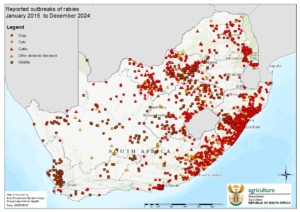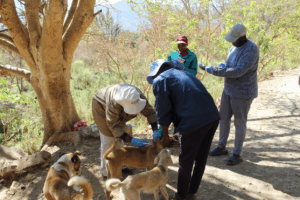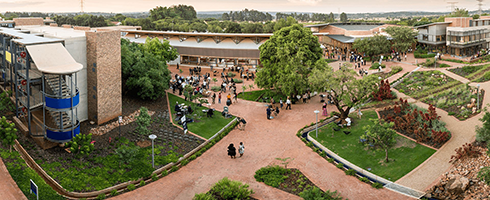You are here: Home1 / Challenge Domains2 / One Health3 / Future Africa reflects on World Rabies Day 2025
Future Africa reflects on World Rabies Day 2025
On 28 September, the world marked World Rabies Day 2025 under the theme “Act Now: You, Me, Community.”
Future Africa, the University of Pretoria’s pan-African platform for collaborative research, joins the global call for urgent action against rabies, a disease that is deadly but entirely preventable.
Rabies remains one of the deadliest zoonotic diseases, claiming lives in humans and animals alike. Yet, it is entirely preventable through vaccination and timely treatment. This year’s theme reminds us that responsibility lies with each of us, individuals, communities, and institutions, to eliminate the disease once and for all.
Despite being preventable, rabies continues to present a serious public and animal health challenge in South Africa. In 2024, 344 laboratory-confirmed animal cases were reported nationwide, and in 2025 alone, 166 cases were confirmed between January and June. Human fatalities also persist, most commonly due to exposure to infected dogs in hotspots including Limpopo, KwaZulu-Natal, the Eastern Cape, and the Free State or Lesotho border.
A call for collective action
Professor Wanda Markotter, Future Africa Research Chair on People, Health, and Places (One Health) at the University of Pretoria (UP), emphasises that eliminating rabies requires urgent, collective action across all levels of society.
“The power to end rabies lies in our ability to act together towards the common goal of vaccinating dogs and educating the public. Let’s act to gather data and use it as evidence to inform and justify our decisions. Let’s act to mobilise resources and distribute them where they are needed. Let’s act to empower communities with rabies knowledge. We have a collective responsibility to drive the change we want to see, a future free from rabies,” says Professor Markotter.
Future Africa’s role in rabies prevention
Through the One Health approach, Future Africa works to address the interconnected health of people, animals, and the environment. Under the leadership of Professor Wanda Markotter, the platform emphasises collaboration and community engagement to tackle critical health challenges.
In partnership with the Ga-Mampa Livestock Committee, the Limpopo Department of Agriculture and Rural Development, Afrivet Training Services, and researchers from UP’s Centre for Viral Zoonoses, the platform facilitates a dog vaccination campaign in Ga-Mampa village, Limpopo. This initiative not only prevents rabies but also strengthens community health and builds trust between researchers and local residents.
The platform is also a proud member of the National Rabies Advisory Group (RAG) of South Africa, working alongside universities, government departments, veterinarians, and civil society to strengthen awareness, prevention, and policy advocacy.
Towards a rabies-free future
Through responsible pet ownership, community mobilisation, and strong partnerships, South Africa can move closer to rabies elimination. By acting now—you, me, community—we can achieve a future free from this devastating disease.
Image credit: Department of Agriculture
More information about the 2025 theme
The theme emphasises shared responsibility:
- You – Every individual can act: vaccinate your dogs and cats, learn how to respond to potential rabies exposure, and spread awareness.
- Me – Each of us can lead by example: support vaccination drives, share accurate information, and inspire others to act.
- Community – Together, we can drive change: organise vaccination campaigns, educate children and families, and advocate for stronger elimination programmes.
Core facts every community must know
- Rabies is 99.9% fatal once clinical signs appear, but 100% preventable with vaccination and timely treatment.
- Immediate action saves lives: wash any bite, scratch, or lick wound thoroughly with soap and running water, and seek medical attention without delay.
- Pet vaccination is the law: dogs and cats must be vaccinated from 12 weeks of age, boosted within 1–12 months, and again every three years (annually in high-risk areas).
- Any mammal can be infected, including pets, livestock, wildlife (jackals, foxes, mongooses), and even Cape fur seals.
- Movement of unvaccinated pets spreads rabies across provinces, responsible ownership is critical.





